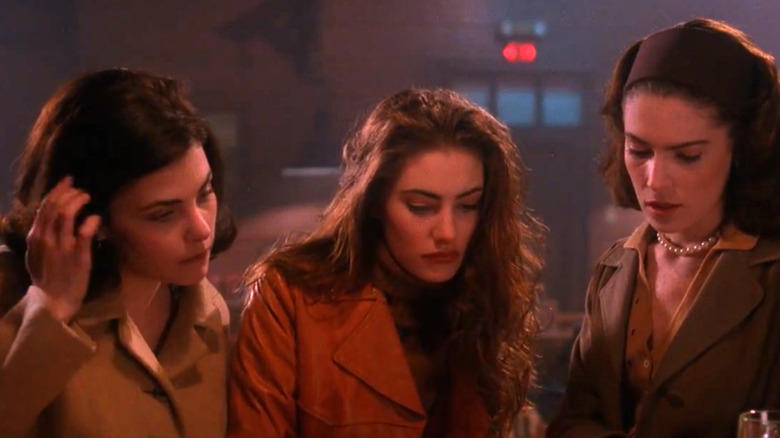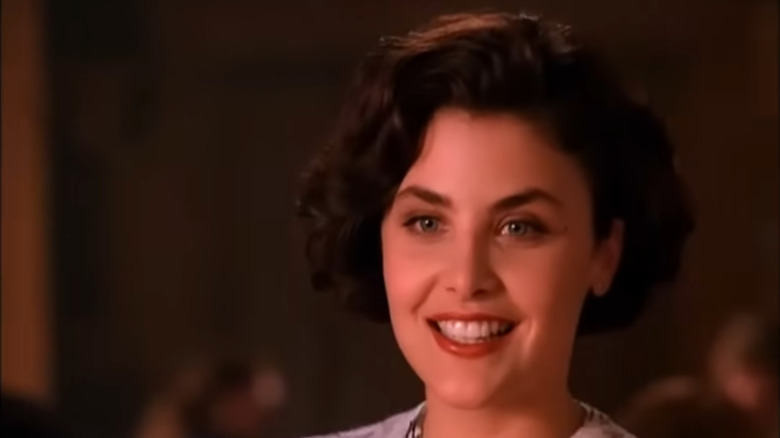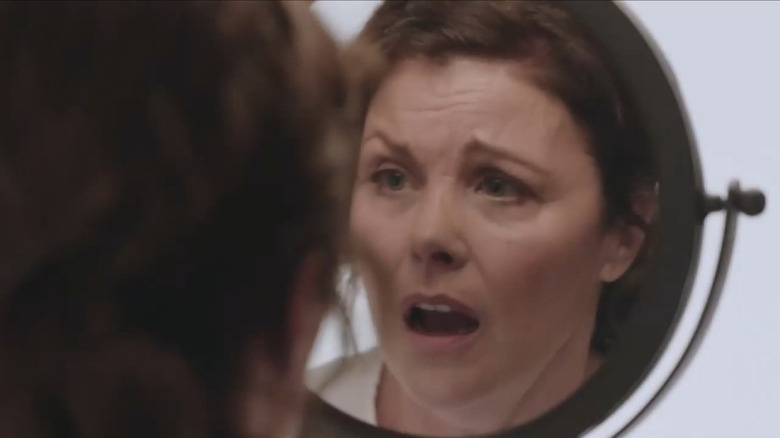A Twin Peaks Star's Real-Life Jealousy Killed A Major Relationship On The Show
Among the many fan-favorite characters of the original run of "Twin Peaks," Audrey Horne (Sherilyn Fenn) still reigns supreme. The mysterious, eccentric daughter of one of the town's most important businessmen, Audrey is pretty much always up to something interesting. When she's not messing with Norwegian businessmen, she's infiltrating a brothel or dancing mysteriously in a diner. She also has a crush on the lead character Dale Cooper (Kyle MacLachlan) that a lot of viewers could relate to.
It's that crush of hers on Cooper that led to what many fans consider a big disappointment of the show's later episodes. Despite her and Cooper having clear chemistry, despite Cooper seeming intrigued by her, the show never does anything with them. Some would say this was for the best — Audrey the character is 17 after all — but Sherilyn Fenn would disagree.
"It was a silly thing that Audrey Horne and Agent Dale Cooper didn't stay together, because that's what should've happened," she said in a 2014 interview. "It happened organically, without anyone making a plan for it to happen. But they had to stop it because... [Takes a deep breath.] People got mad and jealous and... it was just stupid. Ugh."
What did Fenn mean by "people"? Well, she meant Lara Flynn Boyle, who played Donna Hayward throughout seasons 1 and 2. Donna would later be played by Moira Kelly in the groundbreaking prequel film "Twin Peaks: Fire Walk With Me," and Donna wouldn't be seen at all in "Twin Peaks: The Return," but none of this led to any kind of renewed Audrey/Cooper romance. As Fenn explained further:
"What happened was that Lara was dating Kyle [MacLachlan], and she was mad that my character was getting more attention, so then Kyle started saying that his character shouldn't be with my character because it doesn't look good, 'cause I'm too young. Literally, because of that, they brought in Heather Graham—who's younger than I am—for him and Billy Zane for me. I was not happy about it. It was stupid."
To be fair, an Audrey/Cooper romance was probably ill-advised
Although it is unfortunate to see a workplace jealousy get in the way of an organic developing storyline, ultimately it's hard to be too upset. Although I can't deny the chemistry between the two characters, and although Fenn's performance (the actress being well into her mid-20s at the time) makes it easy to forget how young her character's supposed to be, ultimately I don't like the idea of Cooper putting the moves on a high schooler.
Cooper's refusal to entertain a romance with Audrey helps to cement an important aspect of his character: that this guy is a true gentleman, who understands things like power dynamics and basic boundaries. Seasons 1 and 2 are all about establishing Good Cooper, so that when we see Cooper's evil doppelganger in the season 2 finale it truly means something.
Throughout "The Return," Evil Coop makes such a strong villain because it's been so clearly established how kind and pure the original Cooper is; to see such an evil presence steal his appearance feels extra painful as a result. Having the original Cooper do something as sleazy as dating young Audrey would undermine all of that. Maybe he could've still been a sympathetic character to many viewers, but he wouldn't have been the paragon of virtue for viewers to look up to.
The problem is that, once the writers decided that Cooper and Audrey would never be a thing, it doesn't seem like they had a clear plan for Audrey going forward. Audrey's season 2 storyline is a mess to say the least, and it ends with her nearly dying in a bank explosion in an unresolved cliffhanger. Her fate wouldn't be revealed until "The Return" over 25 years later, and even then viewers are still a little confused as to what exactly happened.
The Return takes the Cooper/Audrey shipping and turns it on its head
Unlike much of season 2, season 3 of the show (which is commonly known as "Twin Peaks: The Return") was a period where creators David Lynch and Mark Frost returned to having full control over the plot. The result is that Audrey's storyline — while still disappointing to some fans — at least seemed to have more intentionality behind it.
Audrey spends the entirety of "The Return" trapped in what appears to be a coma, or perhaps she's hallucinating in a mental hospital, or maybe she's trapped in an alternate dimension not unlike what happened to Cooper in the Black Lodge. One thing's clear: poor Audrey's been removed from the rest of the show, isolated from the town of "Twin Peaks" she once rebelled against. She's never shown to escape this bizarre fate she's trapped in.
That sounds bleak, but it gets bleaker: it's revealed that after the bank explosion in season 2 she was stuck in a coma for an undefined period, and during that period Evil Cooper raped and impregnated her with their son Richard Horne (Eamon Farren). Throughout "The Return," Richard wreaks havoc throughout the town as a sociopathic criminal, before finally being murdered (albeit indirectly) by his own father, Evil Coop.
It's a dark storyline, one that feels like a perverse response to all the Audrey/Cooper shipping in the fandom. Ultimately, something did come out of the Audrey/Cooper romance storyline, but it was something so heinous and depressing that it killed any fan appetite for more. Outside of perhaps Laura Palmer herself, Audrey has the most tragic life story of any major "Twin Peaks" character. "The Return" was the rare TV revival that refused to dwell on nostalgia and offer fans a feel-good ending, and that approach is made clearest of all with poor, forgotten Audrey Horne.


